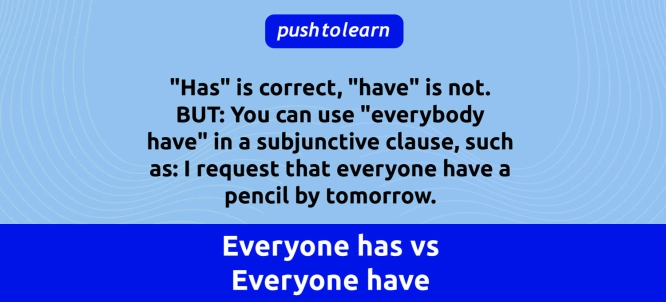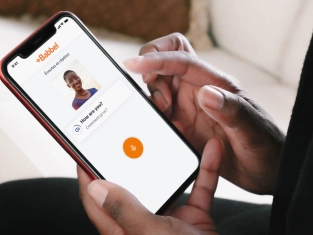by PushtoLearn
Everyone has vs Everyone have - Explanation, Exercise, Quiz
Table of Contents
Everyone has vs. Everyone have - Exercise and Quiz
This exercise focuses on the correct use of verbs with indefinite pronouns and other similar cases, helping students practice subject-verb agreement.
Understanding "Everyone"
"Everyone" is a singular pronoun. It refers to every person in a group, but we treat it like one person. Even though "everyone" talks about many people, it acts like he, she, or it, which are also singular pronouns.
For example:
-
Everyone is welcome. (Just like: He is welcome. / She is welcome.)
-
Everyone has a book. (Just like: He has a book. / She has a book.)
This means we use singular verbs with "everyone."

Why It's "Everyone Has" (Not "Everyone Have")
When we use "everyone," we must also use a verb form that matches a singular subject. Let's look at the verb "to have" in the present tense:
|
Subject |
Verb (to have) |
|
I |
have |
|
You |
have |
|
He/She/It |
has |
|
We |
have |
|
They |
have |
Since "everyone" is singular, we use "has," which is the singular form of "to have." So, the correct phrase is:
-
Everyone has a pencil.
Common Mistakes
Many learners mistakenly say "everyone have" because "everyone" refers to many people. But remember, it is treated as singular, so using "have" is incorrect. Here’s the correct way:
|
Incorrect |
Correct |
|
Everyone have a good time. |
Everyone has a good time. |
|
Everyone have their own bag. |
Everyone has their own bag. |
Everyday Use
You will see "everyone has" in everyday conversations, announcements, or instructions when talking about what each person in a group owns or does. For example:
-
Everyone has a part to play in the team.
-
Everyone has finished their homework.
FAQ
Why do we use "has" with "everyone"?
"Everyone" is a singular pronoun, so it uses the singular form of the verb "to have" (has).
Is "everyone have" ever correct?
No, "everyone have" is incorrect in standard English because "everyone" is singular.
Can we use "everyone" with "have" in any case?
Only in questions or with modal verbs like "does," for example, "Does everyone have a ticket?" Here, "have" is used because of "does."
How can I remember this easily?
Think of "everyone" like "he" or "she." Just like we say "he has" or "she has," we say "everyone has."
Does "everybody" follow the same rule as "everyone"?
Yes! "Everybody" is also singular, so it follows the same rule: "Everybody has."

